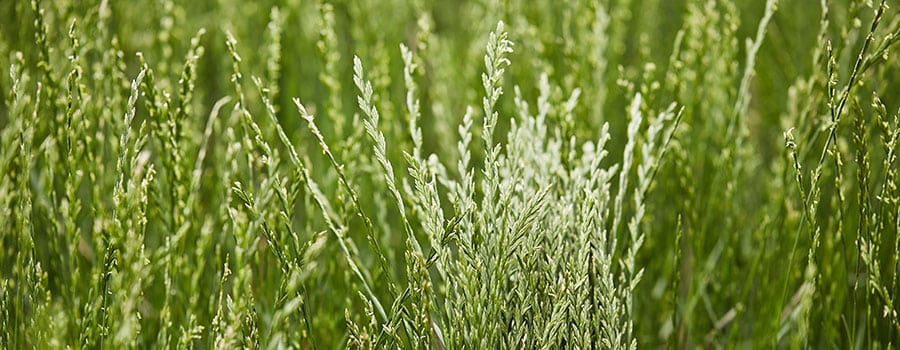Field Selection
Perennial ryegrass responds well to moisture and nitrogen. It is adapted to different soil types, ranging from light textured sandy soils to heavy clay soils. The field must be free of residual herbicides such as Edge, Treflan and others. It is important to review the herbicide history of the field before planting. As well, a field that has had glyphosate applications and is clean of quackgrass is essential.
Weed Control
Wild oats, cleavers and quackgrass are the worst weed problems. Wild oats, cleavers and other broadleaf weeds can be controlled with herbicides; however, there is no in-crop control for quackgrass.
Seeding
Conventional seeding equipment can be used. Seeded at 8 lbs/acre, air drills, air seeders and hoe drills work well.
Harvesting
Perennial ryegrass must be swathed, usually in late July to early August. It is earlier than most crops so it can help split up the harvest. Harvesting usually takes place about seven days after cutting depending on weather. Dry is 11%, but ryegrass can be harvested at 14% or 15% and dried in an aeration bin. Heat cannot be used as it can affect germination.
Seed Yield
Perennial ryegrass yields in Manitoba and Saskatchewan have ranged from 600 to over 1,600 lbs/acre net clean seed, with a five-year average of 800 lbs.
| Features | |
|---|---|
| Crop Type | Grass |
| Revenue | High |
| Rotation | Short |
| Moisture Tolerance | Medium – High |
| Harvesting | Early |
Moisture Chart
| METER READING | % MOISTURE | METER READING | % MOISTURE |
|---|---|---|---|
| 1 | 9.14 | 21 | 13.62 |
| 2 | 9.36 | 22 | 13.84 |
| 3 | 9.59 | 23 | 14.07 |
| 4 | 9.81 | 24 | 14.29 |
| 5 | 10.03 | 25 | 14.51 |
| 6 | 10.26 | 26 | 14.74 |
| 7 | 10.48 | 27 | 14.96 |
| 8 | 10.71 | 28 | 15.19 |
| 9 | 10.93 | 29 | 15.41 |
| 10 | 11.15 | 30 | 15.53 |
| 11 | 11.38 | 31 | 15.86 |
| 12 | 11.5 | 32 | 16.08 |
| 13 | 11.83 | 33 | 16.31 |
| 14 | 12.05 | 34 | 16.53 |
| 15 | 12.27 | 35 | 16.75 |
| 16 | 12.5 | 36 | 16.98 |
| 17 | 12.72 | 37 | 17.2 |
| 18 | 12.95 | 38 | 17.43 |
| 19 | 13.17 | 39 | 17.65 |
| 20 | 13.39 | 40 | 17.87 |
10%-11% moisture is dry however must aerate to avoid sweating
Can harvest as high as 15% moisture and air down
| FRACTIONAL METER READING VALUES | |||||
|---|---|---|---|---|---|
| 0.1 | 0.02% | 0.4 | 0.09% | 0.7 | 0.16% |
| 0.2 | 0.04% | 0.5 | 0.11% | 0.8 | 0.18% |
| 0.3 | 0.07% | 0.6 | 0.13% | 0.9 | 0.20% |
| INSTRUCTIONS | |
|---|---|
Example |
|
| For reading of 16.0 moisture is | 12.50% |
| Fractional meter reading values for 0.4 is | 0.09 |
| Thus dial reading of 16.4 is | 12.59% |

